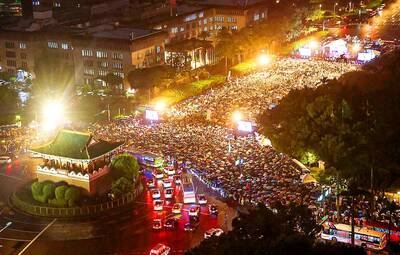The Ministry of Education’s addition of a monthly allowance to its student loan program could leave a growing number of students with debt nightmares, Democratic Progressive Party Legislator Kuan Bi-ling (管碧玲) said yesterday.
Kuan said during a question-and-answer session at an Education and Culture Committee meeting that a college graduate might be left with debts of up to NT$400,000 (US$11,700) if he or she depended on a loan to pay for four years of college.
Students would owe another NT$240,000 by the time they graduate if they applied for the NT$6,000 monthly allowance the ministry introduced as part of its student loan system, Kuan said.
“With current student loan interest rates, these students would have to pay about NT$7,000 per month for about eight years to repay the loan,” Kuan said.
“How can a recent graduate with a monthly salary of NT$20,000 get married and have a family if he or she has to pay off a student loan and rent as well?” she said.
Kuan voiced her opposition to the plan after the ministry on Wednesday introduced a program in which students whose annual family income was less than NT$1.2 million (US$35,500) could apply to borrow a maximum of NT$6,000 per month to cover living expenses.
The measure would take effect in the next semester at the earliest, the ministry said.
The number of students applying for student loans has been on the rise since the 1994 academic year, the latest ministry figures show. The figure has grown from 40,000 applicants in 1994 to 759,000 in the 2007 academic year.
The ministry’s data show that unpaid student debt stands at NT$4.4 billion and is expected to exceed NT$4.5 billion by the end of the year.
Instead of issuing more loans, the ministry should make more scholarships available, Kuan said.
Vice Minister of Education Wu Tsai-shun (吳財順) responded to Kuan’s concerns by saying the ministry planned to have the government fully subsidize the interest on student loans for people from low-income families.

The Central Weather Administration (CWA) today issued a "tsunami watch" alert after a magnitude 8.7 earthquake struck off the Kamchatka Peninsula in northeastern Russia earlier in the morning. The quake struck off the east coast of the Kamchatka Peninsula at 7:25am (Taiwan time) at a depth of about 19km, the CWA said, citing figures from the Pacific Tsunami Warning Center. The CWA's Seismological Center said preliminary assessments indicate that a tsunami could reach Taiwan's coastal areas by 1:18pm today. The CWA urged residents along the coast to stay alert and take necessary precautions as waves as high as 1m could hit the southeastern

FINAL COUNTDOWN: About 50,000 attended a pro-recall rally yesterday, while the KMT and the TPP plan to rally against the recall votes today Democracy activists, together with arts and education representatives, yesterday organized a motorcade, while thousands gathered on Ketagalan Boulevard in Taipei in the evening in support of tomorrow’s recall votes. Recall votes for 24 Chinese Nationalist Party (KMT) lawmakers and suspended Hsinchu City mayor Ann Kao (高虹安) are to be held tomorrow, while recall votes for seven other KMT lawmakers are scheduled for Aug. 23. The afternoon motorcade was led by the Spring Breeze Culture and Arts Foundation, the Tyzen Hsiao Foundation and the Friends of Lee Teng-hui Association, and was joined by delegates from the Taiwan Statebuilding Party and the Taiwan Solidarity

Instead of threatening tariffs on Taiwan-made chips, the US should try to reinforce cooperation with Taiwan on semiconductor development to take on challenges from the People’s Republic of China (PRC), a Taiwanese think tank said. The administration of US President Donald Trump has threatened to impose across-the-board import duties of 32 percent on Taiwan-made goods and levy a separate tariff on semiconductors, which Taiwan is hoping to avoid. The Research Institute for Democracy, Society, and Emerging Technology (DSET), a National Science and Technology Council think tank, said that US efforts should focus on containing China’s semiconductor rise rather than impairing Taiwan. “Without

The National Museum of Taiwan Literature is next month to hold an exhibition in Osaka, Japan, showcasing the rich and unique history of Taiwanese folklore and literature. The exhibition, which is to run from Aug. 10 to Aug. 20 at the city’s Central Public Hall, is part of the “We Taiwan” at Expo 2025 series, highlighting Taiwan’s cultural ties with the international community, National Museum of Taiwan Literature director Chen Ying-fang (陳瑩芳) said. Folklore and literature, among Taiwan’s richest cultural heritages, naturally deserve a central place in the global dialogue, Chen said. Taiwan’s folklore would be immediately apparent at the entrance of the